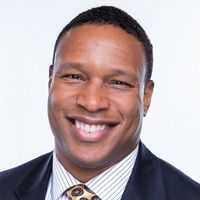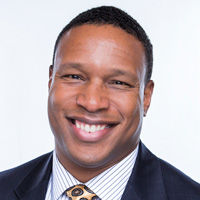Don’t You Dare Fixate on the ‘Game’ of Investing
Chasing stock returns without setting a clear, long-term goal is never a good idea. Instead, take a “big picture” approach.


Profit and prosper with the best of Kiplinger's advice on investing, taxes, retirement, personal finance and much more. Delivered daily. Enter your email in the box and click Sign Me Up.
You are now subscribed
Your newsletter sign-up was successful
Want to add more newsletters?

Delivered daily
Kiplinger Today
Profit and prosper with the best of Kiplinger's advice on investing, taxes, retirement, personal finance and much more delivered daily. Smart money moves start here.

Sent five days a week
Kiplinger A Step Ahead
Get practical help to make better financial decisions in your everyday life, from spending to savings on top deals.

Delivered daily
Kiplinger Closing Bell
Get today's biggest financial and investing headlines delivered to your inbox every day the U.S. stock market is open.

Sent twice a week
Kiplinger Adviser Intel
Financial pros across the country share best practices and fresh tactics to preserve and grow your wealth.

Delivered weekly
Kiplinger Tax Tips
Trim your federal and state tax bills with practical tax-planning and tax-cutting strategies.

Sent twice a week
Kiplinger Retirement Tips
Your twice-a-week guide to planning and enjoying a financially secure and richly rewarding retirement

Sent bimonthly.
Kiplinger Adviser Angle
Insights for advisers, wealth managers and other financial professionals.

Sent twice a week
Kiplinger Investing Weekly
Your twice-a-week roundup of promising stocks, funds, companies and industries you should consider, ones you should avoid, and why.

Sent weekly for six weeks
Kiplinger Invest for Retirement
Your step-by-step six-part series on how to invest for retirement, from devising a successful strategy to exactly which investments to choose.
One of the main reasons Americans save and invest is to create income that will help fund their retirement.
And while investing is serious business, it also can be fun and intoxicating. In fact, maybe a little too fun and too intoxicating at times. As a result, some people get so caught up in playing the “game” of investing that they lose sight of the goal of investing, and that makes them and their portfolios more vulnerable to market turmoil than they need to be.
Investing, of course, comes with an element of risk, but those who get too involved in the game often take more risk than might be prudent. The results can be disastrous.
From just $107.88 $24.99 for Kiplinger Personal Finance
Become a smarter, better informed investor. Subscribe from just $107.88 $24.99, plus get up to 4 Special Issues

Sign up for Kiplinger’s Free Newsletters
Profit and prosper with the best of expert advice on investing, taxes, retirement, personal finance and more - straight to your e-mail.
Profit and prosper with the best of expert advice - straight to your e-mail.
A good example of how that plays out happened in 2008 when the market plunged, forcing many retirees to go back to work and others to alter their retirement timelines.
So, how can you stay fixated on the goal of investing and avoid letting yourself become too enticed by the game of investing?
Here are a few tips to help you remain focused on what matters:
Calculate how much income you need in retirement
As I mentioned earlier, your overarching goal with investing is to create retirement income. But just how much income do you need? No one can give you an exact figure, because the answer is relative to how you want to live. The number will be different for each person. But I would say this: As you try to estimate a number, focus on your life and your goals rather than on what the market is doing.
- Are you a traveler who plans to use the extra time retirement gives you to visit the Grand Canyon, Paris or other bucket-list destinations?
- Are you a grandparent who wants to give your grandchildren an assist in paying for college?
- Are you a single person who loves to putter in the garden and, for the most part, plans to live a frugal life?
Once you decide what your retirement lifestyle will look like, you can begin to calculate the income you will need to accomplish it.
Review your expected sources of retirement income
When your working life ends and that regular paycheck stops, where will your income flow from? Do you have a pension? (Fewer and fewer people do, but perhaps you are one of the lucky ones.) Certainly, you may be able to draw Social Security, but the amount you will receive varies depending on when you start taking it.
You also should have investments you can draw from. Figure on an annual withdrawal of about 3.5% to 4% from those investments. Then total all those sources of income and compare the sum to the amount of money you estimated you would need to pay for your retirement lifestyle.
Is there a gap? If so, you now have a target number to reach before retirement. With that number, you know whether you need to increase your savings, be aggressive with investments or perhaps work a little longer than you originally planned.
Protect what you have
Once you reach your investment goal, you have won the game. Congratulations! Now it’s time to protect your income.
Sure, the market is an exciting place to be, but that doesn’t matter to you anymore. Those are risks you no longer need to take, because you have what you need. Instead, you want to begin to move some of your money into less volatile vehicles, such as bonds and even CDs. The amount that one should direct to safer vehicles will depend on each individual’s situation. With that said, it is not uncommon to see retirees allocate 30% to 60% of their retirement funds to more stable investments.
Remember this: When you are working and saving for retirement – especially in your younger years — you are playing offense. But as retirement approaches and you have accumulated what you need, it’s time to play defense. You are in a preventative game, not a fling-it-down-the-field type of game.
And just like football teams have different coaches for offense and defense, you may need a different coach at this stage of your investing life. Some financial professionals are focused on offense — helping you accumulate what you will need for retirement. Others are better at defense — helping you protect what you worked so hard and took so long to acquire.
Find the right coach, stick to the right plan and that retirement lifestyle you dreamed about could become a reality.
Ronnie Blair contributed to this article.
Investing involves risk, including the potential loss of principal. Any references to protection benefits, safety, security, or lifetime income generally refer to fixed insurance products, never securities or investment products. Insurance and annuity product guarantees are backed by the financial strength and claims-paying ability of the issuing insurance company. The appearances in Kiplinger were obtained through a PR program. The columnist received assistance from a public relations firm in preparing this piece for submission to Kiplinger.com. Kiplinger was not compensated in any way.
The appearances in Kiplinger were obtained through a PR program. The columnist received assistance from a public relations firm in preparing this piece for submission to Kiplinger.com. Kiplinger was not compensated in any way.
Profit and prosper with the best of Kiplinger's advice on investing, taxes, retirement, personal finance and much more. Delivered daily. Enter your email in the box and click Sign Me Up.

Clifton Ross is president and CEO of Guardian Resources. He is a financial professional who has worked for more than 20 years in business operations, management and the financial industry. He is an Investment Adviser Representative and has passed the Series 65 securities exam. At Guardian Resources, he has built a comprehensive retirement planning company to ensure that retirees have the guidance necessary to help reach their goals.
-
 Ask the Tax Editor: Federal Income Tax Deductions
Ask the Tax Editor: Federal Income Tax DeductionsAsk the Editor In this week's Ask the Editor Q&A, Joy Taylor answers questions on federal income tax deductions
-
 States With No-Fault Car Insurance Laws (and How No-Fault Car Insurance Works)
States With No-Fault Car Insurance Laws (and How No-Fault Car Insurance Works)A breakdown of the confusing rules around no-fault car insurance in every state where it exists.
-
 7 Frugal Habits to Keep Even When You're Rich
7 Frugal Habits to Keep Even When You're RichSome frugal habits are worth it, no matter what tax bracket you're in.
-
 For the 2% Club, the Guardrails Approach and the 4% Rule Do Not Work: Here's What Works Instead
For the 2% Club, the Guardrails Approach and the 4% Rule Do Not Work: Here's What Works InsteadFor retirees with a pension, traditional withdrawal rules could be too restrictive. You need a tailored income plan that is much more flexible and realistic.
-
 Retiring Next Year? Now Is the Time to Start Designing What Your Retirement Will Look Like
Retiring Next Year? Now Is the Time to Start Designing What Your Retirement Will Look LikeThis is when you should be shifting your focus from growing your portfolio to designing an income and tax strategy that aligns your resources with your purpose.
-
 I'm a Financial Planner: This Layered Approach for Your Retirement Money Can Help Lower Your Stress
I'm a Financial Planner: This Layered Approach for Your Retirement Money Can Help Lower Your StressTo be confident about retirement, consider building a safety net by dividing assets into distinct layers and establishing a regular review process. Here's how.
-
 The 4 Estate Planning Documents Every High-Net-Worth Family Needs (Not Just a Will)
The 4 Estate Planning Documents Every High-Net-Worth Family Needs (Not Just a Will)The key to successful estate planning for HNW families isn't just drafting these four documents, but ensuring they're current and immediately accessible.
-
 Love and Legacy: What Couples Rarely Talk About (But Should)
Love and Legacy: What Couples Rarely Talk About (But Should)Couples who talk openly about finances, including estate planning, are more likely to head into retirement joyfully. How can you get the conversation going?
-
 How to Get the Fair Value for Your Shares When You Are in the Minority Vote on a Sale of Substantially All Corporate Assets
How to Get the Fair Value for Your Shares When You Are in the Minority Vote on a Sale of Substantially All Corporate AssetsWhen a sale of substantially all corporate assets is approved by majority vote, shareholders on the losing side of the vote should understand their rights.
-
 How to Add a Pet Trust to Your Estate Plan: Don't Leave Your Best Friend to Chance
How to Add a Pet Trust to Your Estate Plan: Don't Leave Your Best Friend to ChanceAdding a pet trust to your estate plan can ensure your pets are properly looked after when you're no longer able to care for them. This is how to go about it.
-
 Want to Avoid Leaving Chaos in Your Wake? Don't Leave Behind an Outdated Estate Plan
Want to Avoid Leaving Chaos in Your Wake? Don't Leave Behind an Outdated Estate PlanAn outdated or incomplete estate plan could cause confusion for those handling your affairs at a difficult time. This guide highlights what to update and when.